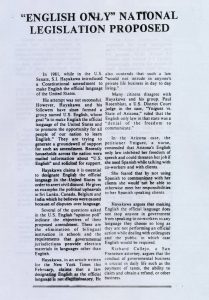April 25, 1990
By Yolanda Reynolds

In 1981, while in the U.S. Senate, S.I. Hayakawa introduced a Constitutional amendment to make English the official language of the United States.
His attempt was not successful. However, Hayakawa and his followers have since formed a group named U.S. English, whose goal “is to make English the official language of the United States and to promote the opportunity for all people of our nation to learn English.” They are trying to generate a groundswell of support for such and amendment. Recently households across the nation were mailed information about “U.S. English” and solicited for support.
Hayakawa claims it is essential to designate English the official language in the United States in order to avert civil discord. He gives as examples the political upheavals in Sri Lanka, Canada, Belgium and India which he believes were caused because of disputes over language.
Several of the questions asked in the U.S. English “opinion poll” indicate the objectives of their proposed amendment. These are the elimination of bilingual instruction in schools and the requirements that governmental jurisdictions provide election materials in languages other than English.
Hayakawa, in an article written for the New York Times this February, claims that a law designating English as the official language is not discriminatory. He also contends that such a law “would not intrude in anyone’s private life business in day to day living.”
Many citizens disagree with Hayakawa and his group. Paul Rosenblatt, a U.S. District Court judge in the case, “Yniguez vs. State of Arizona,” ruled that the English only law in that state was a “denial of the freedom to communicate.”
In the Arizona case, the petitioner Yniguez, a nurse, contended that Arizona’s English only law inhibited her freedom of speech and could threaten her job if she used Spanish while talking with co-workers and with clients.
She feared that by not using Spanish to communicate with her clients she would not be able to otherwise meet her responsibilities to her Spanish speaking clients.
Hayakawa argues that making English the official language does not stop anyone in government from speaking to co-workers in any language they choose so long as they are not performing an official action while dealing with colleagues and the public, in which case English would be required.
Richard Callejo, a San Francisco attorney, argues that the conduct of governmental business is crucial in daily life such as the payment of taxes, the ability to claim and obtain a refund, or other business.
Callejo says that such a law would lead to oppression by unscrupulous people: linguistic and cultural racists who would use the “official language stamp as a means to denied directly or indirectly the rights of those Americans whose language is other than English.”
It is worth noting that while we have here in our country a former U.S.
Senator promoting a single language for communication, other countries are recognizing the linguistic diversity of the world and printing needed information in a variety of languages.
English only advocates blame Congressman Edwards and “leaders of the ethnic class (Hispanics)” who, they say, reject the “melting pot concept and… demand government funding to maintain their ethnic institutions” as the need for an English only law.
Also, English only advocates claim that the “United States is now receiving the largest wave of immigrants in its history.” It’s not certain on what statistics this claim is made.
According to the 1990 World Almanac: since the 1820’s, when immigration records were first collected, the greatest flow of immigration has been from Europe: 67.8 percent.
The four countries that produced the most immigrants were; Germany at 13 percent, Italy 9.8 percent, Great Britain 9.4 percent and Ireland 8.7 percent. Interestingly, during the period of peak immigration from Europe there was not a political party, “The Know Nothings,” which arose to attack the influence, presence and language of immigrants.
Within the same period from the 1820’s to 1988, the total percentage of Americans who had immigrated to the U.S., excluding Canadians, was 13 percent. Canadian immigration within that time period stands at 7.8 percent which brings the total from the Americas to 20.9 percent. The total number of Mexicans to come to the U.S. was 5.2 from 1820-1988.
Some people argue that many people cross the border illegally – this usually in reference to the U.S. border with Mexico, therefore they argue the percentages reported are inaccurate. There Is some truth to this, however, in main line media, there is infrequent mention of the extensive unprotected border we share with Canada, and the likely flow along that border of immigrants from Ireland of from other European countries as well as from India or Taiwan, among others, seeking a better life, mostly economic to the United States.
Contact both national and state legislators, if you wish to express your feelings on this proposed English only amendment.
